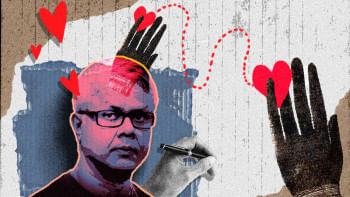Life in modern Dhaka as portrayed in 'A Strange Coincidence and Other Stories'

A Strange Coincidence and Other Stories (ULAB Press, 2022), by QM Billah, is a collection of 11 short stories that encompass a number of ideas, mainly the binary oppositions of the human psyche, all covering the inner conflicts of human life.
In the story "Demand and Supply", the plot is wrapped through the discourse between the consumer and the consumed. The consumed here explores the free will in sexuality and existentialism alongside a developing city dweller's identity. In another story titled, "The Creditor", the protagonist deals with the dilemma between his secret past as a debtor to an escort and the scepticism of facing that creditor in his present life.
Billah, in every story, has consciously constructed in the modern format of short story writing—stories that deal with a single event with an abrupt opening, a single emotion, or the series of emotions called forth by a particular situation. However, in terms of genre, this can be identified as "mixed-genre writing", as the stories intermingle elements of fiction with that of the author's reflections.
The characters, such as Tamanna, Gulbanu, and Kifayet represent real-life people and are reflective of everyday events. To add the local setting and imagination, the author uses several Bangla words, such as banorer khela, kachari ghar, badamwala, dugdugi, etc. However, it would be convenient for non-Bangali readers if the writer could explain the Bangla words in footnotes.
The story "Passport and Ticket, Please!" focuses mainly on two key themes: death and regret. The narrator here goes both into retrospection and introspection by interrogating into his past events. The protagonist narrates the story interchangeably through a realistic narrative and interior monologue but he ends the story with surreal elements of a dream—the symbolic language of the subconscious.
In "Dress as You Like", readers explore a mother (Tamanna) with a dilemma. Her son Tahrir, who has had a seizure, is keen to perform in a 'Dress As You Like' event as a man with a real dancing monkey. Tamanna tried, by all means, but it was next to impossible to find a real monkey in Dhaka that could perform alongside her son in the event. Finally, Tamanna's maid Gulbanu comes up with a solution by offering her son, Maher, to be dressed up as the monkey for the event. The story familiarises readers with the mental crises of modern beings. It also sheds light on the psychological oscillation of a working mother between the reality of life and moral obligation.
Billah unearths a complex range of emotions and moods felt by these characters. Each story poses a significant number of questions during the narration. Throughout the stories, readers are not told exactly what may happen next. They need to read between the lines and beyond the direct answers.
SM Akramul Kabir is an Assistant Professor of English at the Directorate of Secondary and Higher Education, Bangladesh. He is a researcher on English Language Education Policy and Curriculum Planning.

 For all latest news, follow The Daily Star's Google News channel.
For all latest news, follow The Daily Star's Google News channel. 








Comments